HRC56: Dialogue on the Systematic Human Rights Violations, Especially in Regards of Women and Girls, in Afghanistan
The 56th Session of the Human Rights Council
18 June – 12 July 2024
Item 2: Enhanced interactive dialogue on report of the Special Rapporteur on Afghanistan
18 June 2024
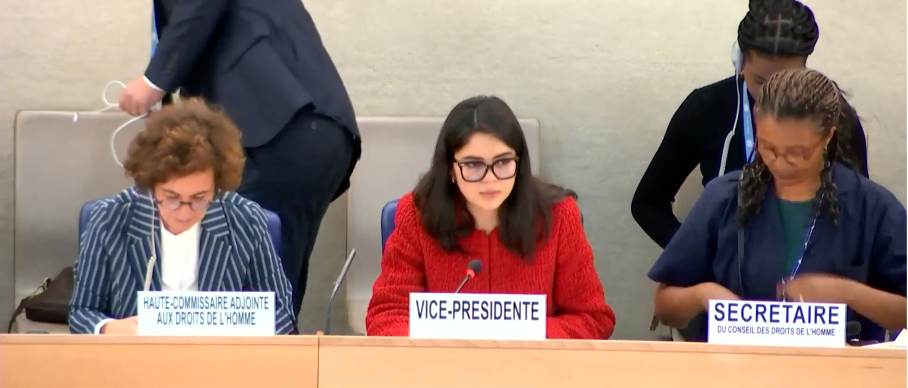
By Inès Najeh / GICJ
Executive Summary
On 18 June 2024, the 1rst and 2nd meeting, on the 56th Session of the Human Rights Council, considered the report (A/HRC/56/25) of the Special Rapporteur on the situation of human rights in Afghanistan, more specifically on the “The phenomenon of an institutionalised system of discrimination, segregation, disrespect for human dignity and exclusion of women and girls”.
The enhanced interactive dialogue opened by statements of different panellists such as the Deputy High Commissioner for Human Rights and the Special Rapporteur himself. Since the Taliban's rise to power, they have imposed severe restrictions on women's rights which have exacerbated poverty and increased the risk of child and forced marriages.
As such, the Deputy High Commissioner for Human Rights, opened the dialogue by highlighting the severe human rights abuses in Afghanistan, particularly affecting women and girls. She condemned the Taliban's institutionalised system of discrimination, which has isolated women from public life and denied them education beyond primary school.
The Special Rapporteur expressed concern over the Taliban's systemic gender oppression constituting a widespread attack on fundamental human rights. In his report he also called for the codification of "gender apartheid" as a crime against humanity.
The Afghan delegation and all delegations, expressed concern about the worsening human rights situation under Taliban rule and highlighted the new ideological risks of dehumanisation affecting young men and boys.
Despite Afghanistan's obligations under international conventions like CEDAW, Taliban's policies severely hinder efforts to promote gender equality and peace. Activist Ms. Benafsha Yaqoobi recalled the more favourable conditions before 2021, urged for inclusive peace-building processes, and stressed the need for humanitarian aid to prioritise women and girls, particularly those with disabilities.
The report also documents severe violations of rights, including torture and enforced disappearances, particularly targeting women who oppose Taliban policies. The institutionalised gender-based oppression is seen as a systematic attack on civilians, qualifying as crimes against humanity.
The Special Rapporteur calls for international action to address these abuses, including recognising gender apartheid as a crime against humanity and using all available legal mechanisms to hold the Taliban accountable. Additionally, the report stresses the importance of including Afghan civil society in global discussions to ensure women's rights are prioritised.
Geneva International Centre for Justice (GICJ) welcomes the Special Rapporteur’s report on the situation of human rights in Afghanistan and stands behind recommendations made in his report, urging the international community to address the human rights violations perpetrated by the Taliban. GICJ strongly condemns the ongoing human rights violations in Afghanistan, particularly under the Taliban's regime. GICJ emphasises the severe impacts of Taliban's policies on women and girls, highlighting the systemic discrimination, exclusion from education and employment, and the lack of access to justice. As such, GICJ urges States to continue providing assistance, especially to those affected by food insecurity and health crisis, including woman-headed households and persons with disabilities.
Background
When the Taliban took control of Afghanistan in the 1990s, a complete regression for women’s rights started. They were immediately forced to leave their jobs, quit school and go back to following the purdah principle. Their oppression of the Afghan people stopped when the US started their military intervention following 9/11.
Thus, the Islamic Republic of Afghanistan emerged, symbolising the will to rebuild the country after years of conflict and political instability. This change was the beginning, once again, of change for women and girls, especially with the adoption of a new constitution in 2004 that enshrined gender equality, allowing the reestablishment of education, work, freedom of movement, etc. For nearly twenty years, the situation of women and girls in Afghanistan has steadily improved, only for it to crumble when the Taliban returned to power in 2021 completely.
Afghanistan is a party to the majority of international treaties protecting Human rights; notably, the Convention against Torture and Other Cruel, Inhuman or Degrading Treatment or Punishment, ratified in 1987, and the Convention on the Rights of the Child (since 1994) and the United Nations Convention on the elimination of discrimination against women (CEDAW) ratified in 2004. However, the international standards derived from ratified texts are now completely ignored and no longer relevant to the Taliban regime.
The situation is getting worse, and it is essential to highlight how Human rights are being violated every day. This grave situation needs to be a wake-up call for the international community since the return of the Taliban wiped out decades of improvement for women’s and girls’ rights and increased poverty in the country.
Furthermore, Afghanistan is vulnerable to natural disasters, which exacerbate the already dire humanitarian crisis in the country. Frequent earthquakes, floods, and droughts not only increase the suffering of the Afghan people but also severely strain the limited resources available for disaster relief. These natural calamities deepen existing poverty and make recovery efforts more challenging, as they damage infrastructure, disrupt livelihoods, and displace communities. The resulting humanitarian distress requires urgent and increased international assistance to address immediate needs and support long-term recovery.
The mandate of the Special Rapporteur on the situation of human rights in Afghanistan was established on 7 October 2021 by the Human Rights Council resolution 48/1. Mr Richard Bennett was appointed as the special rapporteur on 1st April 2022. In his latest report (A/HRC/56/25), the Special rapporteur gave a detailed examination of the systemic oppression of Afghan women and girls, entrenched in the Taliban’s gender-based system of discrimination, segregation, disrespect for dignity and exclusion.
Report of the Special Rapporteur on the situation of human rights in Afghanistan: The phenomenon of an institutionalised system of discrimination, segregation, disrespect for human dignity and exclusion of women and girls
The Report of the Special Rapporteur (A/HRC/56/25) focuses on the situation of human rights in Afghanistan and more specifically, the rights and freedom of women and girls.
The report starts by recalling that Afghanistan, as a signatory to key international conventions and human rights treaties, is bound by significant obligations to uphold human rights and ensure equitable treatment for all its citizens. This commitment involves more than just avoiding violations; it requires actively fostering a legal and institutional framework that promotes the rule of law and accountability. Specifically, Afghanistan is obligated under treaties such as the Convention on the Elimination of All Forms of Discrimination against Women, the International Covenant on Civil and Political Rights, and the International Covenant on Economic, Social and Cultural Rights.
Right to Education
After taking power in 2021, the Taliban imposed a ban on education for girls. The Special Rapporteur noted that girls cannot access education above sixth grade, creating restrictions to access high schools and universities.
The ban on education for women and girls beyond the sixth grade has a significant impact, significantly limiting their ability to gain financial independence, which is crucial for their empowerment, autonomy within families, and survival. With education opportunities restricted, Afghan women and girls face a heightened risk of child marriage and forced marriage. Despite the Taliban's official prohibition against forced marriages, there are troubling reports of their involvement in such practices, especially in rural and isolated areas, with no legal repercussions.
The report recalled an attack on a school which resulted in the death of at least 54 individuals. The Special Rapporteur considered this attack to be an assault that intersects with issues of gender, ethnicity and religion. This attack and the regime’s inability to prevent violence exacerbates the risks associated with pursuing education.
Right to Work
According to the report, the Taliban has severely restricted women's rights to work by banning them from registering organisations and working for non-governmental or foreign entities, with very few exceptions in health and education. Nowadays, access to job sites is limited by the requirement for a male guardian (mahram). These restrictions are aimed at undermining women's financial independence.
Despite these challenges, the Special Rapporteur applauds Afghan women who demonstrate remarkable resilience in supporting themselves and their families. However, the loss of women's income has driven many families further into poverty, leading to increased risks such as child labour and forced marriages.
The report also notes that the Taliban’s policies disproportionately affect unmarried, separated, and widowed women, who rely on male relatives and face heightened vulnerability to abuse and exploitation.
Right to Freedom of Movement
The Special Rapporteur continued his report with the grave violation of the right to freedom of movement. Indeed, the report notes that women are not permitted to “travel more than 72 kilometres from their homes unless accompanied by a mahram” but “this rule is often over enforced, with women and girls prevented from travelling even short distances alone”.
The report contains testimonials of Afghan women being forced to rely on a male relative for accompaniment is demeaning and severely restricts their ability to engage in even simple leisure activities outside their homes. This situation is especially harsh for women without close male relatives, as they are unable to secure a mahram, which impedes their access to crucial services.
Right to Health
Living under a system of gender-based oppression is deeply dehumanising and inflicts both physical and psychological harm. Victims face violence, including killings, sexual and reproductive abuse, leading to serious injuries, chronic health issues.
As a result, psychological distress is prevalent, with reports indicating increased depression and suicidal tendencies among women and girls, exacerbated by economic hardship and job loss. Restrictions on healthcare providers seeing patients of the opposite sex, combined with barriers for women working in healthcare, severely limit access to medical treatment, particularly in rural areas. The mahram requirement further restricts access for women and girls without close male relatives. These specific bans are based on the principle of discrimination and violate the basic right to health for women and girls.
The report of the Special Rapporteur mentioned the means used by the Taliban to enforce these violations of human rights. Indeed, women have been subjected to arbitrary arrests, violence, including sexual abuse, torture, etc) while demonstrating for their rights and freedom. But women are not the only victims of the Taliban as men also risk imprisonment and beating if they refuse to enforce Taliban’s rules on their female relatives.
Moreover, the Special Rapporteur notes that the lack of access to justice for all Afghans have only exacerbated the impunity for the Taliban and their followers.
The report highlights that since the abolition of the Law on the Elimination of Violence Against Women, the associated specialised courts and response units have been dismantled. This action by the Taliban has significantly restricted women’s opportunities to seek justice, escape abuse, and hold perpetrators accountable for their violence.
Moreover, the Special Rapporteur highlighted the severe forms of exclusion and persecution for Afghan women and girls with disabilities, which increases their vulnerability to violence. LGBTQIA+ individuals have reported attacks and threats from Taliban members due to their sexual orientation or gender identity, with some fleeing to neighbouring countries where they continue to face risks and fear deportation. The report also noted that ethnic, religious, and linguistic minorities, including Hazara Shia Muslims and Sikh and Hindu communities, are targeted by extremist groups like ISIS-K, while the Taliban’s response to these attacks is considered inadequate.
Crimes against Humanity
Crimes against humanity, as defined in Article 7 of the Rome Statute, must involve widespread or systematic attacks on civilians, with an awareness of the attack. In his report, the Special Rapporteur concludes that the Taliban's institutionalised system of discrimination and segregation against women and girls in Afghanistan qualify as crimes against humanity, as they represent a coordinated and pervasive attack on the entire population.
The Special Rapporteur’s findings indicate that the Taliban’s regime involves widespread and systematic human rights abuses, including severe restrictions on women's rights and fundamental freedoms. Reports reveal torture and enforced disappearances of human rights defenders and protesters, particularly women. Sexual violence is used strategically to reinforce the Taliban's gender-based oppression, with severe physical and psychological violence inflicted on those challenging the regime.
In his report, the Special Rapporteur advocates for recognising gender apartheid as a crime against humanity, reflecting its severe impact and aligning with international legal norms. He urges an "all tools" approach to address the Taliban's systemic oppression, including utilising international courts and supporting the codification of gender apartheid. Furthermore, he emphasises the need for Afghan civil society, particularly women’s rights defenders, to actively participate in international discussions and ensure that women's rights are a central focus in upcoming diplomatic efforts.
Interactive Dialogue
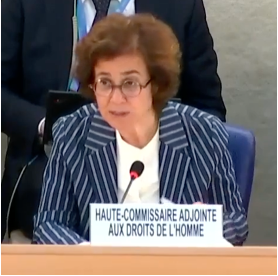
The Deputy High Commissioner for Human Rights, Ms. Nada Al-Nashif, opened the interactive dialogue by recalling the grave abuses happening in Afghanistan that require urgent international attention and support, especially regarding Afghan women and girls. She noted the phenomenon of an institutionalised system of discrimination, segregation and constant disrespect for human dignity, put into place by Taliban policies.
Indeed, the Deputy High Commissioner explains that Taliban edicts have removed women from the public life condemning them to not have any possibility to be seen and heard. She continued, with grave concern, that Afghanistan remains the only country where girls are denied education beyond primary level. Ms. Al Nashif welcomed the Special Rapporteur’s report and emphasised on the impact of policies on women and girls’s mental health, with an increase rate of suicide in the past year, extreme poverty due to the restriction of the right to work, and the lack of access to a justice system for women and girls.
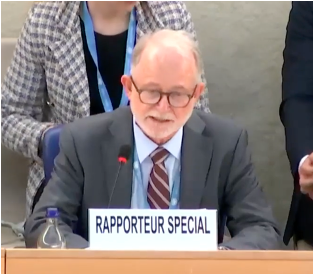
Mr. Richard Bennet, Special Rapporteur on the Situation of Human Rights in Afghanistan presented his report where he explained that the Taliban's institutionalised system of gender oppression constitutes a widespread and systematic attack on fundamental human rights. He also noted that this report deepens the findings of his report with the Working Group on Discrimination against Women and Girls on the Taliban's’ discriminatory and misogynistic policies.
He highlighted that since June 2023 the Taliban have issued approximately 52 edicts that increase restriction on all women and girls in Afghanistan. This has caused significant poverty with increased number of mental health issues and suicide among women and girls.
The Special Rapporteur also noted that “Afghans with intersecting marginalised identities–including people with disabilities, LGBTQIA+ persons, and those from ethnic, religious, linguistic and other minorities– face heightened discrimination and violence”.
Moreover, the Special Rapporteur considered the need to codify the term of “gender apartheid” as a crime against humanity in order to allow justice and accountability for women and girls.
In order to help the situation of women and girls, he ended his statement with an “all tools” approach with 4 pillars: (i) justice and accountability; (ii) incorporating human rights and women’s voices in political processes and diplomatic engagement; (iii) bolstering documentation; and (iv) reinforcing protection and solidarity for Afghan women, girls, and human rights defenders.
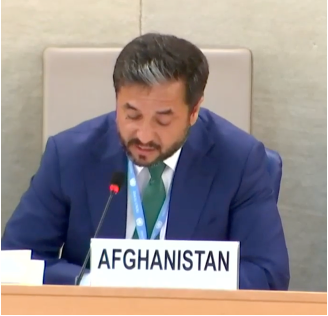
The delegation of Afghanistan welcomed the report of the Special Rapporteur and noted that the country has fallen into “a state of darkness and oppression marked by severe violations of human rights”. The situation is only getting worse under Taliban rule. As such the delegate of Afghanistan drew attention to the dehumanisation of women and girls, beginning to be a new ideology for young men and boys. This is a new risk that has not been fully recognized and addressed yet.
Even though Afghanistan is a party to the CEDAW, ILO conventions and many more, it is currently very difficult to promote gender equality and ensure security and peace for women and girls due to the Taliban policies, as they are neither willing nor capable of carrying basic human rights from the UN Charter. The delegate notes that impunity must not find refuge anywhere and robust accountability mechanisms is crucial to ensure that justice is serves.
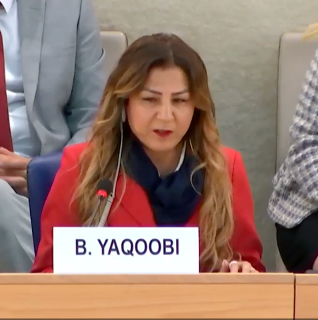
Ms. Benafsha Yaqoobi, Women and Disability Rights Activist started her statement by reflecting on the period before 2021, during the Republic Era, when Afghanistan benefited from support under national laws and international treaties, including the 2004 Constitution, CEDAW, and the UNCRPD. These frameworks allowed, for women, relative access to rights, enabling education, work, and societal participation without fear of detention or persecution for personal choices. Moreover, she emphasised on the impact of “high technology and immigration” might have on the spread of extremism beyond Afghanistan.
In order to resolve the situation, Ms. Benafsha Yaqoobi requested inclusive peace-building processes ensuring the representation of women and marginalised groups in strategy and policy development. Additionally, humanitarian aid should prioritise the inclusion and engagement of women and girls, especially those with disabilities, to address the current crisis effectively.
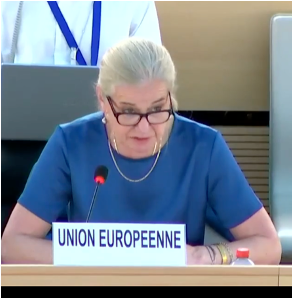
The delegation of the European Union (EU) condemned the systematic human rights violations, particularly against women and girls, by the Taliban regime. The delegate expressed that the practices of the Taliban could amount to systematic gender persecution, a crime against humanity according to the Rome statute. “Accountability for human rights violations and abuses is essential”. The delegation of the EU recalled their gender-responsive humanitarian aid in support to the people of Afghanistan.
A political process in Afghanistan that is inclusive and led by Afghans is necessary. The EU considered that this process should fully and equally involve women and girls, individuals from ethnic and religious minorities, and members of vulnerable groups, including LGBTI persons, to ensure lasting peace, stability, and prosperity in the country.
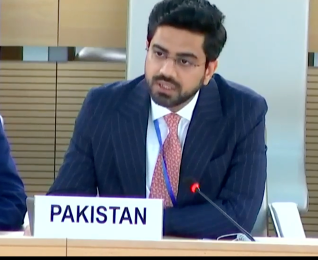
The delegation of Pakistan on behalf of Organisation of Islamic Cooperation (OIC) expressed grave concern over the humanitarian crisis but also the socioeconomic condition in Afghanistan, especially for women and girls. The delegation stresses the need to assess the situation objectively, considering Afghanistan’s historical, political and economic context. The Pakistani delegation urged the Afghan authorities to resume female education and create conditions for women's work, in line with international human rights obligations. Addressing poverty, employment, and essential services, such as healthcare and education, is crucial for realising the human rights of all Afghans. They called on the international community to continue support, warning that underfunding risks Afghan lives and well-being.
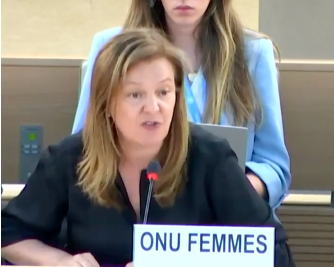
UN Women recalled the grave impact of the Taliban’s decrees and bans on the rights to education. Indeed, approximately 1.1 million girls are now out of school. Due to these restriction, women are marrying at a younger age, creating a 25% increase of child marriage, 45% increase in early childbearing with a very high risk of maternal mortality. UN Women urged the international community to continue its support, political and financial. They concluded by emphasising that “women’s rights matter – not just for some women in some places. But for every woman, everywhere”.
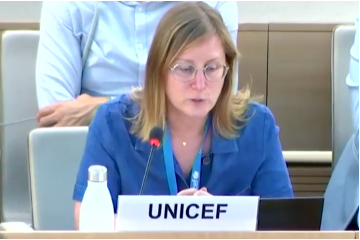
UNICEF started by recalling the 12 million children in urgent need of humanitarian assistance. The representative of UNICEF expressed concern over the high number of children killed and injured by mines, notably explosives being displaced by climate disasters (floods, landslides, etc.).
The prohibition of basic rights for women and girls by the Taliban is increasing the risk of child marriage and child labour. UNICEF urged the authorities to ensure education for all and protect children from any violence. The organisation also called the international community to continue supporting children’s rights notably by increasing their humanitarian actions.
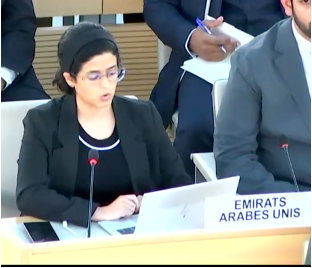 The delegation of United Arab Emirates (UAE) expressed concern over the deterioration of women and children’ rights in Afghanistan. The delegation condemned the Taliban’s decision to ban the right to education for women and girls as it is a clear violation of international human rights law, international humanitarian law and UN resolution on the independent evaluation of Afghanistan. UAE called for the continuation of effort to address the dire situation and for the continuity of building durable peace in Afghanistan.
The delegation of United Arab Emirates (UAE) expressed concern over the deterioration of women and children’ rights in Afghanistan. The delegation condemned the Taliban’s decision to ban the right to education for women and girls as it is a clear violation of international human rights law, international humanitarian law and UN resolution on the independent evaluation of Afghanistan. UAE called for the continuation of effort to address the dire situation and for the continuity of building durable peace in Afghanistan.
The delegate of Turkey was worried over the edicts pushing women and girls out of the public sphere. Indeed, according to the delegation of Turkey the denial of rights, especially the right to education is inhumane. The delegate urged the international community to push the regime to have inclusive politics and take steps in the field of human rights. Turkey considered the UN resolution 27/21 and the UN independent assessment provide necessary ground for a coordinated and structured engagement with Afghanistan.
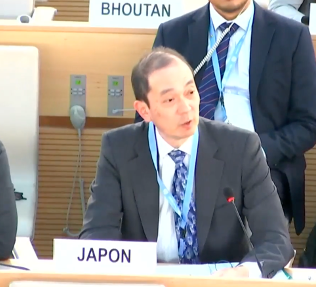
The delegation of Japan noted that the denial of fundamental rights is significantly impacting the “vulnerability of women and curtailing their independence”. Japan concurs with the Special Rapporteur's perspective that, according to the Women, Peace and Security (WPS) Agenda, it is vital to guarantee women's participation in discussions about the country's future and the establishment of enduring peace. The delegation ensured Japan’s will to engage with the Taliban in order to ensure they respect human rights, especially those of women and girls.
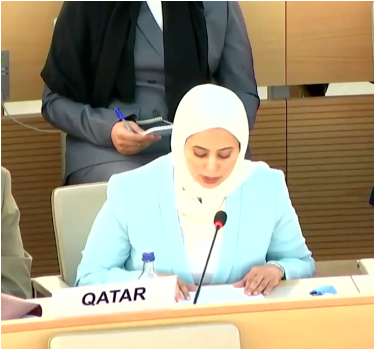
The delegation of Qatar emphasised on the increasing challenges Afghanistan is facing, notably in the humanitarian, economic and human rights areas. Continued support and dialogue are essential to finding sustainable solutions. The delegation of Qatar recalled their substantial humanitarian aid to Afghanistan, including 1080 tonnes from 2021-2024, assistance for flood victims in Baghlan, and the construction of a specialised hospital for women and children. Additionally, Qatar has partnered on educational projects with the Qatar Fund for Development and the Afghan Ministry of Education. Qatar also hosts important meetings on Afghan affairs, including the UN-organized meeting in Doha to enhance international coordination on humanitarian and development programs, promote human rights, and support Afghan women and girls.
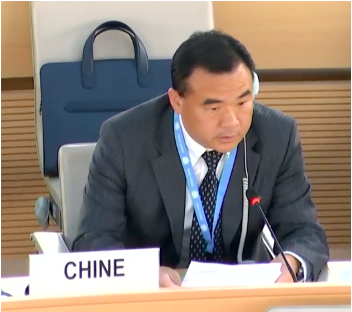
The delegation of China noted that China is closely following the future and safety of Afghan people. However, the delegation noted that some countries have imposed major unilateral sanctions causing Afghanistan’s assets to be frozen. These sanctions have aggravated the suffering of the people and undermined their human rights. The delegation of China called for human and development assistance and for the respect of humanitarian principles, to ensure an Afghan-led process to address the pressing needs.
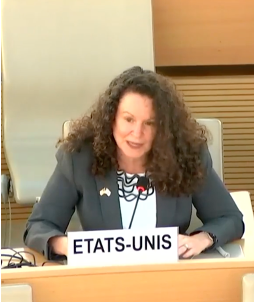
The delegate of the United States of America (USA) expressed concern over the systemic and escalating human rights violations in Afghanistan especially the constant targeting of women and girls. The delegation also noted the rise of “public floggings of those suspected of adultery or homosexuality”. The USA urged the international community to stand with all Afghans and called for the reversal of repressive actions and demand justice and accountability for the committed abuses.
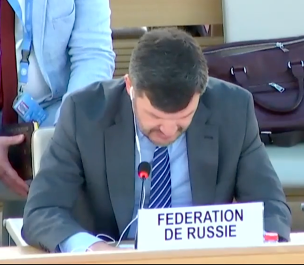
The delegation of the Russian Federation supports the Afghan people's right to peace and stability, recognizing that regional order depends on this. The delegation stressed the necessity of cooperating with Afghanistan's de facto authorities on various issues, including human rights, to achieve lasting peace. Russia is closely monitoring the humanitarian and socio-economic conditions, particularly women's rights to education and work, and emphasises the need for an inclusive government. The delegation of the Russian federation criticised the “irresponsible” withdrawal of foreign troops in 2021, which left Afghanistan facing severe financial and humanitarian crises and unprecedented unilateral sanctions. The delegation expressed disappointment over the Special Rapporteur’s oversight of these issues. The delegation concluded by reminding that Russia advocates for a realistic and comprehensive approach based on balanced and objective analysis.
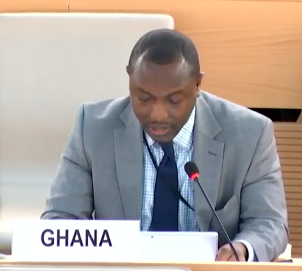
For the delegation of Ghana the situation of women and girls in Afghanistan remains a current concern and a future threat to the country's peace, stability, and development if not properly addressed. The delegation urged the Taliban to end discriminatory policies and lift restrictions on human rights of women and girls. The delegate encouraged the international community to increase support to meet basic needs like food and medical care. The delegate expressed Ghana’s commitment to a stable, secure, and peaceful Afghanistan, believing that a renewed Afghanistan benefits the global community.
The delegation of South Africa expressed their support for a society free of gender inequality, institutionalised racial discrimination and dehumanisation. While taking note of the report’s recommendation, the delegate of South Africa noted that codifying the concept of “gender apartheid” would risk weakening the term of “apartheid” as a heinous crime against humanity.
Non-Governmental Organisations Statements
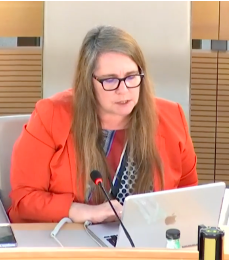
The NGOs expressed their gratitude for the Special Rapporteur's report and conveyed deep concern over the severe situation in Afghanistan, particularly regarding human rights abuses and gender-based violations. They emphasise the urgent need for the international community to take decisive action.
However, multiple NGOs noted that the normalisation of relations with Taliban will undermine hope and disregard the suffering of all Afghan people.
Some NGOs recalled that in Afghanistan, half the population have been erased from society, enduring severe repression amounting to gender apartheid. The Special Rapporteur's latest report confirms these large-scale, systematic gender-based violations, making normalisation of relations with the Taliban unacceptable.
Numerous organisations noted that the rights of women and girls must be prioritised in any discussions about Afghanistan's future. An inclusive and stable Afghanistan requires justice and accountability, including addressing LGBT issues.
Humanitarian aid must reach all Afghans in need, especially marginalised groups, without discrimination. The international community has a moral and legal duty to oppose gender apartheid and hold the Taliban accountable for their crimes.
Concluding remarks
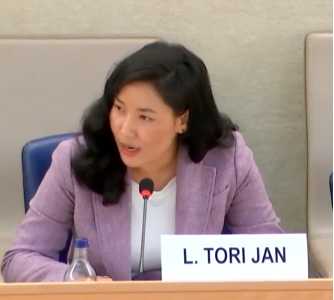
One of the panellists, Ms. Lina Tori Jan, Human Rights Activist emphasised the need to include women and civil society in all discussions concerning Afghanistan in order to improve the dire crisis. The panellist at this interactive dialogue encouraged delegates and civil society to not get discouraged by the lack of progress and the complexity of the situation. There is an urgent need to follow commitments through action and uphold international law.
In Afghanistan, both economic and political realities highlight the urgent need for women's inclusion in these sectors. Ms Shafiqa Khpalwak, noted that women are striving for a meaningful role in the economy and politics, with immediate and long-term solutions required. Short-term, it is crucial to address the education crisis by finding innovative ways for girls, currently deprived of schooling, to continue their education, whether through online platforms or clandestine schools.
There are limited opportunities for their engagement, as such panellists considered the codification of “gender apartheid” for women to access justice and achieve gender equality.
Finally, Mr. Richard Bennett, Special Rapporteur, emphasised the urgent need for action, noting that his call for intervention could not be clearer or more compelling. He expressed disappointment that, rather than addressing the report's findings, the Taliban dismissed it as false. Mr. Bennett conveyed sincere gratitude to the Afghan people for their courage in defending their fundamental human rights and stressed that it is essential to respond to their bravery with meaningful and effective action.
Geneva International Centre for Justice (GICJ)
The Geneva International Centre for Justice (GICJ) extends its gratitude to the Special Rapporteur for his thorough report and appreciates the ongoing discussion regarding the critical situation of women and girls in Afghanistan. Since the Taliban's return to power, the conditions for women have severely deteriorated, impacting their fundamental rights to work, education, healthcare, and their freedom of movement, opinion, and expression. The Taliban's actions, including the issuance of restrictive edicts, blatantly disregard international human rights standards and have led to the systematic and egregious discrimination of women and girls. This persistent discrimination is driving Afghan women and girls towards a state of « gender apartheid »,as mentioned by the Special Rapporteur, effectively erasing their presence from public and social life.
GICJ underscores the urgent need for decisive action from the international community to address this grave human rights crisis. The plight of Afghan women and girls is not just a local issue but a global concern that reflects our collective commitment to upholding human rights and achieving gender equality. There is a pressing need to both educate and empower women locally and globally to foster peace and drive international action.
Furthermore, GICJ calls upon Member States to continue and increase their support, particularly in the face of the severe food insecurity and health crises impacting all in need, including women-headed households and persons with disabilities. Ensuring that humanitarian aid reaches these vulnerable groups is crucial to alleviating their suffering and supporting their rights. The international community must act swiftly and effectively to combat the systemic injustices faced by Afghan women and girls and restore their fundamental freedoms and rights.
#HumanRightsCouncil #HRC56th #InteractiveDialogue #Afghanistan #HumanRights #GenderEquality #Non-Discrimination #HumanitarianAid #International Law #GenevaInternationalCentreforJustice #Geneva4Justice #GICJ







